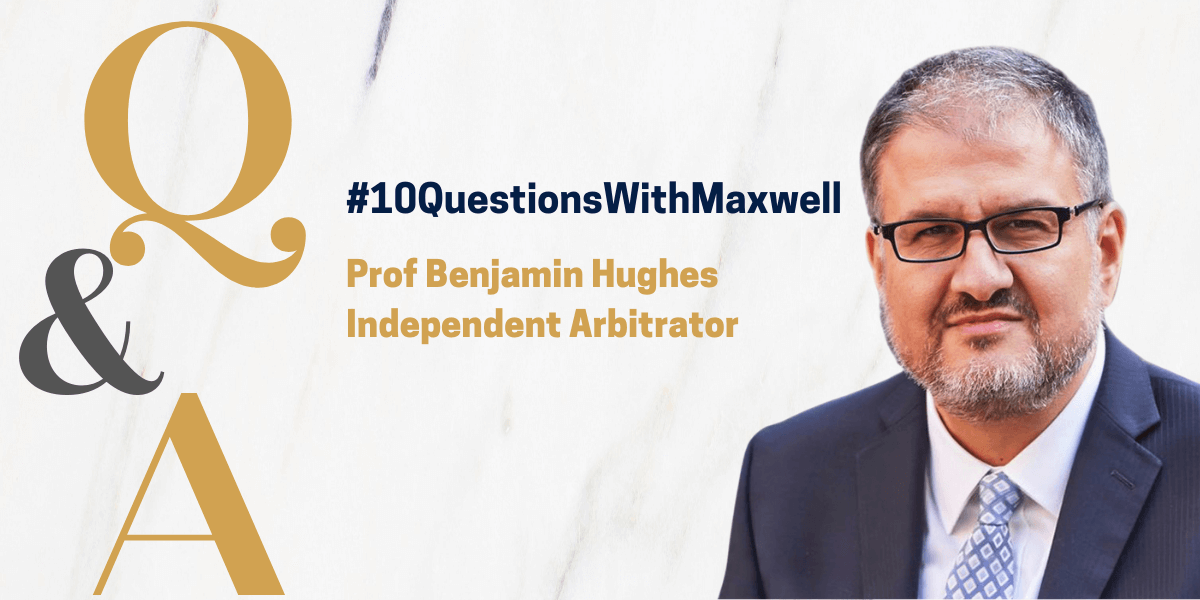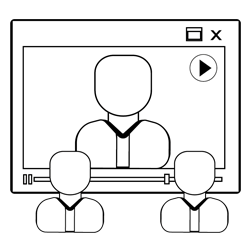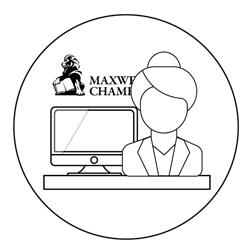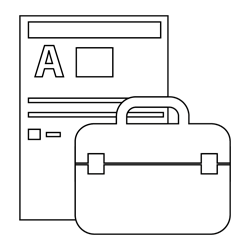Interviews

#10QuestionswithMaxwell Interview Series: Prof Benjamin Hughes, Independent Arbitrator
Our next #10QuestionsWithMaxwell interview features Prof Benjamin Hughes, an independent arbitrator, member of the SIAC Court, resident at The Arbitration Chambers and adjunct professor of the National University of Singapore Faculty of Law.
In this interview, he shared with us his proudest achievement in his career, what he finds most challenging about being an arbitrator, his teaching philosophy and more.
Read his full interview below:
Q: What attracted you to a career in arbitration?
A: When I started my legal career, I was not interested in doing any disputes work. I wanted to have a nice peaceful career doing deals and bringing parties together. This was not only naïve, but I soon found it extremely boring! Fortunately, I was assigned to a few international arbitration cases related to Latin America and Asia due to my linguistic background, and I just fell in love with it. Every case is unique, with different seats, procedural rules and applicable laws – and with parties, counsel and arbitrators from every corner of the globe. It is impossible to get bored in this field!
Q: Tell us your arbitration style.
A: I don’t think there is any one-size-fits-all approach in international arbitration. My approach in any given arbitration may vary depending on various circumstances, including the nature of the dispute, the background of the parties and counsel, the seat of the arbitration, the procedural rules, the applicable law, etc. In general, however, I would say I am relatively strict when it comes to discovery and tend to take a more civil law approach in this regard. I also take a dim view of delay tactics, and tend to hold the parties’ feet to the fire in terms of compliance with the procedural timetable. But every case is different, and the Tribunal’s approach must be flexible enough to adjust to the requirements of the dispute at hand.
Q: Virtual and hybrid hearings are becoming the new norm. How has that affected hearings proceedings, in your opinion?
A: Since the outbreak of the pandemic I have participated in over 20 virtual arbitration hearings. I confess I was a bit skeptical at first, but I am pleased to say they work very well. Our collective experiences with virtual hearings will forever change the way arbitrations are conducted, even when the pandemic is finally behind us. Given how well virtual arbitral proceedings have worked, it no longer makes sense to require a witness to travel halfway around the world to give only a few hours of testimony. Going forward, I expect we will see more hybrid hearings, in which some witnesses or experts will attend by video conference, thereby saving time and cost for the parties.
Benjamin attending a virtual hearing from home, captured by his wife
Q: Even with your extensive experience in arbitration practice, what do you find most challenging about being an arbitrator?
A: That’s a good question. I suppose the most challenging aspect of being an arbitrator is that in some ways you must start from scratch with each appointment. Each case presents a novel combination of different factual and legal issues, commercial sectors, jurisdictions, procedural rules, applicable laws, counsel, co-arbitrators, and so on. But this complexity and variety is also one of the main reasons I enjoy it so much. You never stop learning!
Q: If you could change one thing about the arbitral system, what would it be?
A: I believe it was Blaise Pascal who said: “I’m sorry I wrote you such a long letter, but I didn’t have time to write a short one.” Parties should take the time to focus their submissions on matters that are truly relevant and material to the outcome of the arbitration, rather than taking a “kitchen sink” approach. The most persuasive submissions are sharp and focused, succinctly stating the issues in dispute between the parties and the factual and legal arguments in support of their position. Nevertheless, in recent years submissions have tended to grow longer and longer, with a great deal of unnecessary and redundant verbiage. In order to assist the parties and save the sanity of Tribunals, I would allow Tribunals to impose word limits on all submissions, witness statements and expert reports.
Q: What skills and traits would you encourage in the next generation of arbitration lawyers?
A: Young lawyers and law students today are so far ahead of where I was at that stage of my career that I am not sure I am qualified to give them any advice! But I would just offer some words of encouragement, because they are facing a very tough job market. There are many more superb young lawyers who want to practice international arbitration than there are jobs in this field. My advice is not to worry too much if you cannot land a job in an arbitration practice group right out of law school. Most of today’s leading arbitration practitioners did not start out in arbitration, and gaining practical experience in any substantive area of law will be very helpful to you in your career in arbitration should you decide to pursue it. So if you can’t find a job in an arbitration practice group right away, just start working in the law and find your way to arbitration over time. Your career will be long and rewarding, and you have plenty of time.
Q: You have taught extensively in the field of international dispute resolution and comparative law since 2015 at Seoul National University Law School and now at the National University of Singapore Law School. Share with us your teaching philosophy.
A: I believe in learning by doing, so I tend to get the students involved in practical exercises such as drafting submissions, making oral arguments, and even drafting awards based on real-life scenarios based on my previous cases. This is much more interesting for the students than listening to an old fogey like me lecturing them for three hours per week.
Q: Looking back in your career, what has been your proudest achievement?
A: I have been very fortunate to have such a rewarding career to date. While I cannot say I have achieved anything of monumental importance, my proudest moments have been watching my former associates and students grow and develop into such superb lawyers. Some of them have even appeared before me in arbitration cases – with mixed results!
Q: To get to know you more on a personal level, tell us three fun facts about yourself?
A: I asked my wife for help on this one, and she confirms that there are no facts about me which are any fun. However, if you will settle for three mildly interesting facts:
(i) Although I now teach at a law school, in a previous life I was an elementary school teacher (first grade and kindergarten) in the bilingual education program in San Antonio, Texas. As a side hustle I was also a piano teacher.
(ii) I once had a very brief cameo in a Korean drama. No, I will not share the clip or tell you the name of the show.
(iii) Although I am from rural East Texas, where we have more cattle than people, I am a vegetarian. Several relatives have disowned me.
Q: Lastly, share with us your fondest memories of Maxwell Chambers / Maxwell Chambers Suites.
A: I have many fond memories of Maxwell Chambers and MC Suites. Prior to the pandemic, I probably spent as much time there as I did at home! I have held many hearings and attended many great events at Maxwell Chambers, and worked many late hours in my office at MC Suites. It really is the heart and soul of the arbitration community in Singapore, and I look forward to the easing of the current restrictions soon so we can all be together again.











